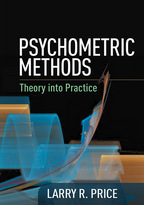Psychometric Methods
Theory into Practice
Larry R. Price
Hardcovere-bookprint + e-book
Hardcover
orderDecember 12, 2016
ISBN 9781462524778
Price: $98.00552 Pages
Size: 7" x 10"
Read the Series Editor's Note by Todd D. Little
“This book is suitable for emerging assessment professionals and practitioners who are interested in learning psychometrics but with little knowledge in statistics. It provides not only a theoretical foundation to the topics but also worked examples to highlight their practical applications. The syntax, output, and interpretations based on software programs like SPSS and BILOG-MG will help readers to bridge theory and methods with hands-on examples. This book would be a convenient toolbox for applied researchers who would like to conduct psychometric analyses, and it would also serve as a handbook for graduate students who study measurement and psychometrics.”

—Psychometrika
“This excellent book explores the basic concepts of psychometric knowledge and practice….This would be a great addition to the libraries of graduate students and researchers.”

—Doody's Review Service
“I like the book and it meshes well with what I plan to do in my course. I particularly like the generalizability theory, norms and test equating, scaling, and validation process chapters. It is very easy reading—I am planning to use the book next spring.”

—R. J. de Ayala, PhD, Chair of Educational Psychology, University of Nebraska–Lincoln
“I encourage all psychologists and educators to read this marvelous book. I learned a lot from reading it. The key terms are very useful, as are the chapter summaries. Readers of all levels will find material relevant to them, including SPSS code and GfGc datasets on intelligence that will be quite useful in trying out the ideas. I give this book my highest recommendation and think it will be a great classroom text.”

—John J. McArdle, PhD, Department of Psychology, University of Southern California
“This book is both comprehensive and accessible, laying the foundation for all the requisite skills needed to be both a successful consumer and producer of psychometrics. Scholars who are unfamiliar with measurement could easily teach themselves from this text, becoming quite proficient at psychometrics. There is excellent integration of quantitative statistics throughout, so that readers will be able not only to understand the psychometric concepts, but also to apply their knowledge. This is a useful text for a graduate-level Psychometric Methods or Measurement class.”

—Debbie L. Hahs-Vaughn, PhD, Department of Educational and Human Sciences, University of Central Florida
“An encyclopedia of psychometric issues—a real 'must have' for anyone teaching Tests and Measurement or Research Methods, or directing student research projects. The book's high level of detail makes it invaluable for any professional who works with, creates, or analyzes psychometric material. The use of intelligence testing data throughout the chapters helps bring cohesiveness.”

—John Wallace, PhD, Department of Psychological Science, Ball State University
“With vast expertise in psychometric instrument development, statistical applications, and research, Price has produced a theoretically informed, practical volume. Professionals in health-related fields will find this book extremely valuable for guidance in the development of rigorous instruments, such as patient-reported outcome measures. Featuring examples using a range of software, this text is ideal for graduate courses on measurement in schools of medicine, public health, nursing, or health professions.”

—Byron J. Gajewski, PhD, Department of Biostatistics, University of Kansas Medical Center
—Psychometrika
“This excellent book explores the basic concepts of psychometric knowledge and practice….This would be a great addition to the libraries of graduate students and researchers.”
—Doody's Review Service
“I like the book and it meshes well with what I plan to do in my course. I particularly like the generalizability theory, norms and test equating, scaling, and validation process chapters. It is very easy reading—I am planning to use the book next spring.”
—R. J. de Ayala, PhD, Chair of Educational Psychology, University of Nebraska–Lincoln
“I encourage all psychologists and educators to read this marvelous book. I learned a lot from reading it. The key terms are very useful, as are the chapter summaries. Readers of all levels will find material relevant to them, including SPSS code and GfGc datasets on intelligence that will be quite useful in trying out the ideas. I give this book my highest recommendation and think it will be a great classroom text.”
—John J. McArdle, PhD, Department of Psychology, University of Southern California
“This book is both comprehensive and accessible, laying the foundation for all the requisite skills needed to be both a successful consumer and producer of psychometrics. Scholars who are unfamiliar with measurement could easily teach themselves from this text, becoming quite proficient at psychometrics. There is excellent integration of quantitative statistics throughout, so that readers will be able not only to understand the psychometric concepts, but also to apply their knowledge. This is a useful text for a graduate-level Psychometric Methods or Measurement class.”
—Debbie L. Hahs-Vaughn, PhD, Department of Educational and Human Sciences, University of Central Florida
“An encyclopedia of psychometric issues—a real 'must have' for anyone teaching Tests and Measurement or Research Methods, or directing student research projects. The book's high level of detail makes it invaluable for any professional who works with, creates, or analyzes psychometric material. The use of intelligence testing data throughout the chapters helps bring cohesiveness.”
—John Wallace, PhD, Department of Psychological Science, Ball State University
“With vast expertise in psychometric instrument development, statistical applications, and research, Price has produced a theoretically informed, practical volume. Professionals in health-related fields will find this book extremely valuable for guidance in the development of rigorous instruments, such as patient-reported outcome measures. Featuring examples using a range of software, this text is ideal for graduate courses on measurement in schools of medicine, public health, nursing, or health professions.”
—Byron J. Gajewski, PhD, Department of Biostatistics, University of Kansas Medical Center



